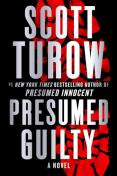
by Scott Turow
Hardcover- $20.98
Click on the ORANGE Amazon Button for Book Description & Pricing Info
Overall rating:
How would you rate this book?
Member ratings
Presumed Guilty, Scott Turow, author; Grover Gardner, narrator
Mae Potter and Aaron Housley are an item in Skageon County, Wisconsin. They have been close since they were in middle school. Although Aaron was black and Mae was from a white, very prominent family, they gravitated toward each other. They had vastly different personalities, triggering a turbulent relationship, but their love for each other was real and seemed unstoppable. Both families objected to their growing relationship over the years. Mae was known as trouble. Aaron did not measure up to her parent’s standards.
Mae’s parents were Charmaine, a sympathetic figure in a wheelchair, and her father was Harrison or Hardy as his friends called him. He was the County Prosecuting Attorney. Her grandfather was Mansfield Potter IV, known as Mansy. He was a lawyer.
Aaron’s mother was Bea Housley, a school principal. She was Native American. Her father was Joe Mena, not known for his kind demeanor, but Joe and Aaron were close. Her mother, Willi, has passed. Aaron’s father and stepmother, Lloyd and Camille, were not that involved with his life. Bea was engaged to Rusty Sabich, a retired attorney who had once been falsely accused of a crime. Aaron’s family was not prominent or wealthy. Coincidentally, however, Rusty and Mansy were best friends.
When Aaron and Mae decided to give their love one last chance at success, they made arrangements to go off the grid without the use of cell phones so they could have a heart to heart and discuss their future. They went to Harold’s Woods in Skageon County. Could they really make a go of it and marry, in spite of the troubles their relationship had always produced? Mae’s behavior was sometimes erratic, Aaron was introspective and a loner, especially since he was a young black man in a place where few black men resided. They had both previously been on drugs leading to Aaron’s arrest and probation.
With the help of Pastor Proctor, his stepmother's uncle, who visited Aaron when he was incarcerated, Aaron was now clean and G-d-fearing. He was making plans for a real future. Mae was still using drugs, but giving them up was a precondition if their relationship was to continue. Neither of them was supposed to bring drugs to their rendezvous, but Mae not only brought drugs, she also did not turn off her phone. She was taking lots of selfies and posting them online. She wanted to be an influencer. If she could not change her behavior, their relationship would have to end. Aaron was growing more and more disappointed.
When he returned home alone, days later, after breaking his probation rules, Mae did not return at all. Where was she? Why did Aaron hitchhike home and leave her behind with her SUV, but take her phone and her credit cards? Why did he burn his backpack and sleeping bag, and throw away the shoes and clothes he had been wearing? Mae’s father used his influence to start a major search for her. He called in several branches of law enforcement. Soon, Aaron was arrested for Mae's murder.
Aaron’s family did not have the money to hire a top lawyer or any fancy investigators the way Mae’s family had. They prevailed upon Rusty to take Aaron’s case. It was pretty much against his will, but soon, they realized they had no other choice and he agreed to be the Defense Attorney and represent Aaron in the murder trial. He would face Hiram Jackdorp, the Prosecuting Attorney in Marenago County. He had quite a good reputation and had been reelected several times.
For the first third of the book, it proceeds a little too slowly, but be patient, because once the investigation and trial begin, it is really interesting and engaging. The jury selection and court proceedings expose the flaws and virtues of the justice system. As the defense and prosecuting attorneys attack the case with vigor and expertise, the back and forth is compelling. The presentation of the evidence is like a performance designed to make the jury think one thing or another, depending on whether or not it comes from the prosecution side or the defense side. The evidence dances in the wind, from one direction to another, as each one spins it in a different way, only revealing as much as necessary to make their point and sway the jury. It seems charisma plays an important role, as well. There is an enormous burden placed on the shoulders of the judge who must decide when and how evidence may be presented. Statements are overruled or sustained based on narrow rulings in the law. Experts and witnesses are sworn in for both sides. Rules are bent in some instances. Attorneys try to stretch the rules to make their point more believable. This is the way the system works. Racism is an important theme of the novel as it plays a part in the very justice system that is on trial with the accused. There is a surprise ending, so don’t read ahead.
Book Club HQ to over 90,000+ book clubs and ready to welcome yours.
Get free weekly updates on top club picks, book giveaways, author events and more








